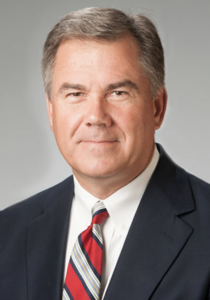
Significant Sig Mark Tipton, TULANE 1978, has decades of experience in the banking and financial industry. He is executive vice president and Georgia regional president of IBERIABANK’s operations in the state of Georgia. He also is past chairman and CEO of Georgia Commerce Bank, which was acquired by IBERIABANK in 2015, and was head of commercial banking for First Union National Bank of Georgia. He is a member of the Fraternity’s Constantine Housing Initiative board, as well as the house corporation board for his undergraduate chapter, where he is a member of the Board of Tulane governing body at his alma mater.
Tipton spoke with Sigma Chi about the impact of the COVID-19 pandemic on small businesses and steps small businesses and individuals can take during this time.
You’ve had a lengthy career within the banking and financial industry. How does the current COVID-19 pandemic compare with some of the significant highs and lows within the industry over your career?
“I’ve been in banking now 40 years, and I thought I’d seen it all. I went through the Texas meltdown in the 1980s, and we had a meltdown during 2008 to 2010 where 90 banks failed in Georgia alone. This [pandemic] takes the cake. We’re in uncharted territory because this was no fault of our own. This is a pandemic that came upon us, and we’re all figuring out how to survive.”
What have been the steps you have taken at IBERIABANK, and how are small businesses responding to this?
“First and foremost, our bank is primarily focused on privately held owner-operated companies and small businesses of all sorts. If you look at the DNA of the bank, it was built on close relationships with small businesses all across our footprints. There are 30 million small businesses in the United States, and they really are the backbone of the U.S. economy. The government came out with the Paycheck Protection Program [PPP], and the idea was to bridge the gap until we can get the economy moving again by offering loans to cover payroll for a 60-day period so a lot of companies wouldn’t have to lay off employees. Our bank, over a short period of time, has received 9,500 applications for a total of $1.9 billion. This is system-wide for IBERIA. We were able to reserve funds for 90 percent of those. I think that’s one of the highest percentages for our clients. That was through a lot of hard work from the folks here at IBERIA, but it really was to take care of our customers. Our bank was able to work with 565 of our businesses for right at $207 million and reserve funds for them. Hopefully, that will help them navigate these troubled waters until the economy is safely moving again.”
We have a lot of small business owners in Sigma Chi, and many of them have already taken these steps. Outside of the PPP, what are some other steps that small business owners can be taking right now from a financial perspective?
“Relationships matter during this time. Get with your banker, your local banker, sit down and talk through your plan of action. Look at what your particular business needs [are] and put a particular plan in place. What I tell our customers is, ‘We’re partners. We’re in this together, and we’ll work through it together.’ We’re finding ways to work with those who are severely impacted. Some companies have leverage, some don’t. Today it’s important to be a realist because we’re all in this together.
“One other thing: Congress is close to completing a new addition to this PPP plan. If folks haven’t gotten with their bank, talk with them about it. It’s first come, first serve and will move quickly. But I would encourage folks to sit down with their bank and see whether this makes sense for them to apply for.”
There are many individuals who have lost employment, but there are also individuals still fortunate to have jobs at this time. Once this clears, what are some steps individuals can take to prepare financially for a future pandemic or other national emergency?
“What this has driven home is you think you’ve planned for everything, then something like this happens. One takeaway is reserves, making sure that you, over time, build up some rainy-day money to be used for things that are totally unforeseen today. Banks set aside reserves for loans when we book them in the event that some of the good loans we make go bad. Liquidity is really important and the extent you can set aside money for unforeseen circumstances. Each plan, each company, each individual’s situation is going to be different.
“It’s easy to get caught up on the negative. There will be a light at the end of the tunnel. I think you’re already seeing some of the states put together a plan. This too shall pass, and we’ll work through it. I’m an optimist by nature. We’ve got the American spirit, the Sigma Chi spirit. It will get us through this.”

